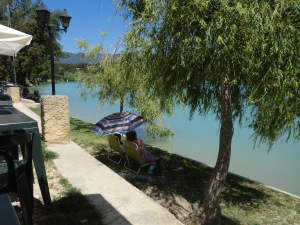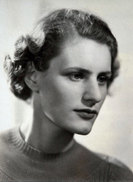 I read most of Diana Athill’s book in two afternoons, sitting under a willow tree beside the lake L’étang de la Bonde as the children swam continuously, refusing to get out until it was time to leave. Despite the fact that we were outdoors, I felt as if I had just spent two days in Athill’s living room, listening to her share this particular segment of her life, that as Editor at André Deutsch, the publishing house where she worked for four decades.
I read most of Diana Athill’s book in two afternoons, sitting under a willow tree beside the lake L’étang de la Bonde as the children swam continuously, refusing to get out until it was time to leave. Despite the fact that we were outdoors, I felt as if I had just spent two days in Athill’s living room, listening to her share this particular segment of her life, that as Editor at André Deutsch, the publishing house where she worked for four decades.
Stet is not a common word and I am perhaps only familiar with it because, back in the old days, when I was a 23-year-old Market Research Assistant without typing skills, I used to write reports and had a secretary to type them. I even had my own office with a door that could be closed. Using the word stet meant I’d changed my mind after I’d crossed something out, wanting it left in. The Concise Oxford Dictionary tells us :

Not the first of Athill’s memoirs, but the one I was attracted to, since it offers a glimpse inside an Editors office. I had already read and reviewed Betsy Lerner’s The Forest For the Trees, which this book made me recall, you could say they complement each other in a certain respect, though they are very different books, as one might expect when comparing the perspective of an English Editor to that of an American Editor. Both equally interesting and insightful in their own way.
In Part One, Athill shares how she fell into publishing as a career, knowing she would have to find a job, while her great-grandparents generation had made or married into money, her father’s generation had lost it and she talks about many aspects of the job, the decisions that were made, the dramas that were lived and worked through.
“The story began with my father telling me: ‘You will have to earn your living.’ He said it to me several times during my childhood (which began in 1917), and the way he said it implied that earning one’s living was not quite natural. I do not remember resenting the idea, but it was slightly alarming…Daughters would not, of course, have to earn their livings if they got married, but (this was never said) now that they would have to depend on love unaided by dowries, marriage could no longer be counted on with absolute confidence.”
The start to her career was disrupted by the onset of the Second World War, however she was fortunate to have a friend working in the recruitment office of the BBC and found an information/research position in the Overseas News Department. She and a friend lived in a small apartment in London and had a good social life, at one of the parties she met the young Hungarian intellect André Deutsch, the start of a lifelong friendship and she would eventually leave her job to join him as a shareholder and working Director when he decided to start his own publishing firm.
Not the easiest of employers, Athill shares some interesting insights about working for an often disagreeable and intolerant man whom she respected despite his deficiencies. She is also quick to point out her own flaws and it is perhaps the counterbalance of their personalities that made them such a successful pair and helped keep the publisher in business for as long as it was able. She also shares her continued love of literature, reading and writing.
“They brought home to me the central reason why books have meant so much to me. It is not because of my pleasure in the art of writing, though that has been very great. It is because they have taken me so far beyond the narrow limits of my own experience and have so greatly enlarged my sense of the complexity of the life: of its consuming darkness, and also – thank God – of the light which continues to struggle through.”
In Part Two, she expounds on her relationship with a small selection of writers, providing a chapter each and very frank accounts of what transpires between Athill, the publishing house and the following authors: Mordecai Richler and Brian Moore, Jean Rhys, Alfred Chester, V.S.Naipul and Molly Keane. One is left with the impression that there was a lot more drama and pandering to personalities in the past than there can be in today’s less nurturing publisher – author relationships. Eye opening indeed!
As I mentioned in the Man Booker Prize longlist post, Diana Athill won the Costa Prize for her most recent memoir Somewhere Near the End in 2009, which she wrote in her nineties, a book which is sure to be equally enlightening and one I look forward to indulging, knowing as I did with this book, it is bound to offer delightful company for future afternoon reading.









Positively scrumptious! I must read her!
Thanks for the marvelous review and introducing me to this fascinating woman.
~Just Jill
LikeLike
She really is fascinating, modest about her own achievements and candid about her role in the publishing industry, a refreshing, honest read.
LikeLike
Fascinating in your telling. I can imagine the memories she carries that still go unshared.
LikeLike
Particularly given she didn’t starting writing memoir until her retirement (at 75), all those years working and living through so much change, meeting so many people, observing so many lives, careers, historic moments. Fabulous really.
LikeLike
It is. Jackie Kennedy edited… on top of everything else, I’m sure she had stories from her profession.
LikeLike
Wouldn’t surprise me to see a book come out on that subject since I gather she also shared her opinions of various people she encountered on tape, but it would be even better to have her insights on the actual profession as well as all the gossip.
LikeLike
Beautiful review, Claire! I learnt a new word today after reading your review – ‘stet’ 🙂 The editor-author relationship part of the book sounds quite fascinating. Is that Naipaul in that picture, smoking a cigarette? I am not a big fan of Naipaul because of some of his recent comments, but he looks really handsome and dashing in that picture. I loved that passage that you have quoted from the book. I would love to read this book sometime. Diana Athill looks like a fascinating person. Thanks for reviewing it.
LikeLike
Yes, that’s Naipaul and she has interesting things to say about that relationship, which if I am correct may have resulted in him stopping speaking to her, back in her sprightly 80’s when she wrote this book, (15 years ago). The chapter on V.S.Naipaul is very interesting, they almost lost him to a rival publisher after she dared to suggest that a character in his recent manuscript wasn’t convincing. What happens next is riveting drama, but I won’t spoil it by telling you, he is one of those writers where it is perhaps necessary to separate the man from his work in order to appreciate it. I haven’t read his books, but I do have Beyond Belief on the shelf, which I will one day get around to reading I am sure. Have you read any of his works?
LikeLike
Interesting to know more about what Athill says about Naipaul, Claire. It is sad that they are no longer on speaking terms. I will look forward to reading this book. I agree with you – Naipaul is one of the writers where it is necessary the man from his work. I find it easy to do that with writers who are no more, but with writers who are still productive, I find it very hard. I read some excerpts from Paul Theroux’ book about his friendship with Naipaul and Patrick French’s biography of Naipaul and wasn’t happy with what I read. Then when I read a recent interview of Naipaul in which he said that women writers aren’t as good as men writers, it made me angry even more. I think it will take me some time to try a Naipaul book. I have read one book by him ‘India : A Wounded Civilization’ and liked it at that time. I was hoping to read ‘A House for Mr.Biswas’ at some point as many friends recommended it. ‘Beyond Belief’ looks like an interesting book. Hope you enjoy reading it. I just checked the Wikipedia page for Naipaul. Can you guess which is the first book on the list of ‘Further Reading’? I am sure you guessed it right – it is Athill’s ‘Stet’ 🙂
LikeLike
Did you see the interview with Diane Athill in Issue 56 of ‘Mslexia’ magazine, my absolute favourite writing magazine and it’s dedicated to women writers. Recommended. Inspirational review as always. xoxox
LikeLike
Yes I did Edith, thank you for the reminder – it was a wonderful interview and part of the reason I sought out this particular book to read. I would have quoted from the interview, but I have given my copy to a friend who is attempting to write a memoir, I thought a few copies of Mslexia would give her inspiration.
It is interesting in the interview that she mentions she has stopped reading fiction, like an after-effect of all those years editing, the genre has ceased to contain the magic of reading it in the early years for her. She said, as I recall, it no longer has the ability to surprise her, that she usually guesses what is going to happen. However non-fiction doesn’t have the same effect, so that is what she reads (and writes) today.
An interesting observation from one who has been reading as long as she has. I guess from childhood, we could each identify our own stages of reading different genres, arriving at where we are now.
LikeLike
Must read this. As an aside I used to see Mordachai Richler all the time, both in Montreal and Toronto. Was in his apartment once with friends who were looking for an apartment in the same building he lived in. Why they showed it to us I will never know. But they did. sadly he wasn’t there. Would have been wonderful to meet him.
LikeLike
I’ve had this on the tbr pile for almost as long as it’s been available but somehow never got round to it. Thanks for the reminder.
LikeLike
I hope this helps move it nearer the top!
LikeLike
Now, this is a must read for me. Loved Athill’s quote. So many times I’ve thought this to be true for me too but I could never have expressed it as eloquently as she.
LikeLike
I love it when we come across quotes that express our own sentiments with such precision. Athill has clearly spent a long time thinking about our relationship with books and working with them, so no surprise she has an insightful yet humble perspective.
LikeLike
Sounds fascinating… ah yes, Stet is one of those words that some of are very familiar with !!!
So interested to read that she has stopped reading fiction… as I have, and always felt vaguely remiss…though I am at this moment ploughing through the 700 pages of Mark Helprin’s A Soldier of the Great War .
I love your blog Claire – it’s so much more than book reviews… it keeps us in touch with the pulse of the writing world…
LikeLike
What a gorgeous setting to read a book! I, too, love the quote you included in your review. Intrigued to read about her working relationship with Jean Rhys.
LikeLike
There is something about your reviews…one just sinks into them and marvels at the worlds you find. Another great introduction for me and a new word to astound people with. It’s been a satisfying day all round.
LikeLike
Stet, close to SteJ, I am sure you won’t forget this word now either. Let it stand. It’s a good one isn’t it.
Thank you for the wonderful compliment, it’s very motivating and reminds me what a joy it is to share the things we marvel at – it makes me want to go back and read with fresh eyes, with equanimity. 🙂 There’s another wonderful word.
LikeLike
For some reason in my urge to comment, I forgot to like this, that is now remedied…
You do have a great style and your writing always makes me cracking a bottle of wine open so I can enjoy them like I did with Nemirovsky’s Fire in the Blood. Not that I am a wine fan but there are certain writers who just give you the urge do such things. My liver thanks you in advance, hehe.
LikeLike
Just as well, I’m not a once a day blogger! Your comment reminds me that some stories do go down better with the aid of a beverage. I once wrote a letter to a friend, recounting an escapade from my travels in Vietnam and started the letter by suggesting she check to see if there was a wine in the fridge and at various points in the letter she had to pour a glass and then take a sip – she told me later she’d received the letter on a Saturday and followed my instructions, the nearest thing to actually being next to someone telling them a story in amazement – adding pauses for exclamations and Really’s? and No Way’s etc as if it really were a conversation. I do think of my reviews as a conversation.
LikeLike
I couldn’t cope with having a drink every day. I like your style, unique and sometimes I do talk to the screen but that is because the other voices in my head make me.
LikeLike
Hi Claire, I read this post on holiday but didn’t comment at the time as it isn’t easy to do on my phone. I’ve made a note of this memoir as it sounds very interesting. I used the word ‘stet’ all of the time when working in derivatives documentation without thinking about where the word came from-so thank you! That spot under the willow tree sounds like a wonderful place to sit and read.x
LikeLike
Wow, that sounds like it needs a definition itself derivatives documentation!
Stet is an interesting conversation point, given the way we work today, it is rarely used or known. I love that Diana Athill gives it honorable mention by putting it up front as her title.
LikeLike
Pingback: Book Review – Somewhere Towards the End by Diana Athill | Vishy's Blog
Hi Claire
Writers, especially those who bloomed so late, are fascinating creatures. Their narrative is shaped by the richness of their experiences and a more compassionate view of life. Diana Athill is a remarkable woman whose memoirs and reminiscences amply depict a life lived on its own terms, a life full of living and a life without regrets. She was truly a writer’s editor.
Ravi Bankar
LikeLike
Thank you Ravi, I wholeheartedly agree and think Diana Athill is a wonderful example of a late bloomer and we are fortunate that after a lifetime of editing she remained inspired to want to continue writing her own work.
I am working with a writer who is writing her first book at almost 80 and she is a complete inspiration to me and I know her book will be so for many many others.
Thank you for visiting and commenting.
Claire
LikeLike
Pingback: Excellent Books About Unforgettable Women #WomensHistoryMonth on #WorldBookDay – Word by Word